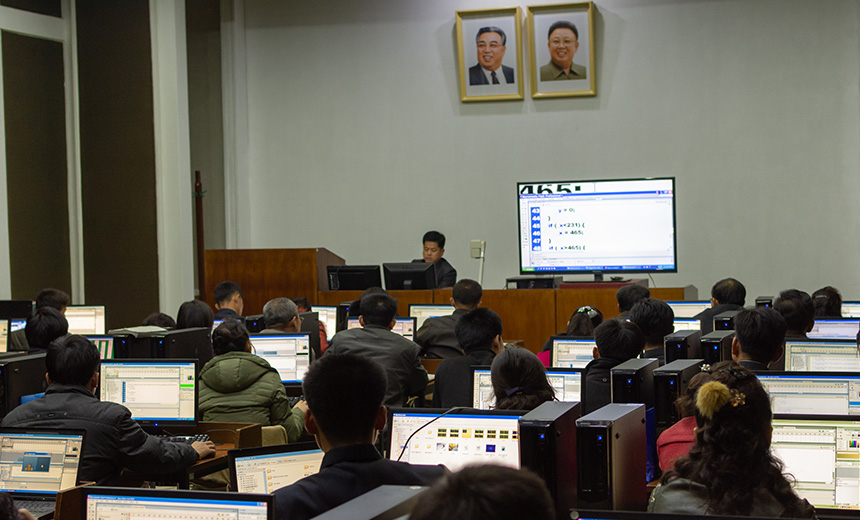North Korean Cyberattacks: Leveraging American Remote Workers For Data Theft

Table of Contents
The Growing Threat of North Korean Cyber Operations
North Korea's cyber warfare capabilities have evolved dramatically over the past two decades. Initially focused on simple data theft, their operations have become increasingly sophisticated, employing advanced techniques to infiltrate networks and exfiltrate sensitive information. The financial motivation behind these attacks is clear: funding North Korea's weapons programs and bolstering its struggling economy. Groups like Lazarus Group, known for their involvement in high-profile attacks against financial institutions and cryptocurrency exchanges, are prime examples of North Korea's cyber espionage capabilities.
- Past Successful Attacks: Lazarus Group is linked to the infamous 2014 Sony Pictures hack and the 2017 WannaCry ransomware attack, demonstrating the group's capacity to cause widespread disruption and financial damage.
- Sophisticated Tactics: North Korean actors utilize advanced malware, exploit zero-day vulnerabilities, and employ social engineering techniques to achieve their objectives.
- Attribution Challenges: While strong evidence points to North Korean involvement in many attacks, definitively attributing specific incidents remains challenging due to the actors' use of sophisticated obfuscation techniques and proxy servers.
Targeting Remote Workers: A Prime Opportunity
The widespread adoption of remote work, accelerated by the COVID-19 pandemic, has inadvertently created a larger attack surface for cybercriminals. Remote workers often operate outside the protective perimeter of corporate security networks, making them easier targets for sophisticated attacks. They may lack the same level of security awareness training and robust endpoint protection that on-site employees receive.
- Vulnerabilities Specific to Remote Work: Unsecured home Wi-Fi networks, reliance on personal devices, and less robust endpoint security software contribute to increased vulnerability.
- Social Engineering Tactics: Phishing emails and other social engineering techniques are highly effective against remote workers who may be less vigilant in their online activities.
- Insufficient Cybersecurity Training: A lack of comprehensive cybersecurity training for remote employees leaves many vulnerable to sophisticated attacks.
Phishing and Spear Phishing Campaigns
North Korean cybercriminals employ highly sophisticated phishing and spear-phishing campaigns to compromise remote workers' accounts. These attacks often involve meticulously crafted emails that appear legitimate, designed to trick victims into revealing credentials or downloading malware. Malicious attachments, links to fake websites, and embedded macros are frequently used to deliver payloads.
- Email Subject Lines and Content: Attackers use subject lines mimicking legitimate communications (e.g., "Urgent Invoice," "Password Reset Request") and tailored content that appeals to the recipient's personal or professional interests.
- Compromised Accounts: Once a victim's account is compromised, attackers often use it to distribute malware to other contacts within the organization, furthering the attack.
- Effectiveness: These methods are effective because they target human psychology, exploiting individuals’ trust and lack of awareness.
The Consequences of Data Breaches
The consequences of successful North Korean cyberattacks can be devastating. Data breaches lead to significant financial losses, reputational damage, and legal liabilities for both individuals and organizations. The theft of sensitive government or military information could have serious national security implications.
- Targeted Data: North Korean hackers target a wide range of data, including financial records, intellectual property, personal information, and even military secrets.
- Long-Term Costs: Recovering from a data breach is expensive, requiring extensive forensic investigation, system remediation, and potentially costly legal fees.
- Incident Response Planning: Having a robust incident response plan in place is crucial to mitigating the impact of a successful attack.
Mitigating the Risk: Best Practices for Remote Workers and Businesses
Both individuals and businesses must take proactive steps to protect themselves from North Korean cyberattacks. Implementing strong cybersecurity practices and raising awareness among remote workers are essential to mitigating the risk.
- Password Management: Use strong, unique passwords for all accounts and consider using a password manager.
- Email Security: Be cautious of suspicious emails, verify sender authenticity, and avoid clicking on links or downloading attachments from unknown sources.
- Software Updates: Keep all software and operating systems updated with the latest security patches.
- Multi-Factor Authentication (MFA): Implement MFA whenever possible to add an extra layer of security.
- Home Network Security: Secure home Wi-Fi networks with strong passwords and enable firewall protection.
- VPNs: Use a Virtual Private Network (VPN) to encrypt internet traffic when using public Wi-Fi.
- Cybersecurity Training: Invest in regular cybersecurity awareness training for all employees to enhance their vigilance.
- Incident Response Planning: Develop and regularly test an incident response plan to ensure a swift and effective response to security incidents.
Conclusion
The threat of North Korean cyberattacks targeting American remote workers is real and growing. These attacks exploit vulnerabilities in remote work environments to steal sensitive data, causing significant financial and reputational damage. By implementing strong cybersecurity practices, improving employee awareness, and developing robust incident response plans, both individuals and businesses can significantly reduce their risk. Preventing North Korean cyberattacks requires a multi-faceted approach, encompassing technical safeguards, employee training, and a commitment to proactive cybersecurity measures. Strengthening security against North Korean cyber threats is not just a matter of IT security; it's a matter of national security and economic stability. Take action today to defend against North Korean cyber espionage and protect your valuable data.

Featured Posts
-
 Nba Injury Report Pacers Vs Kings March 31st Matchup
May 29, 2025
Nba Injury Report Pacers Vs Kings March 31st Matchup
May 29, 2025 -
 Is Simonis De Oplossing Of Kiest Ajax Voor Een Opvallende Naam
May 29, 2025
Is Simonis De Oplossing Of Kiest Ajax Voor Een Opvallende Naam
May 29, 2025 -
 El Legado De Victor Fernandez Presente Y Futuro
May 29, 2025
El Legado De Victor Fernandez Presente Y Futuro
May 29, 2025 -
 Effective Probopass Strategies In Pokemon Tcg Pocket
May 29, 2025
Effective Probopass Strategies In Pokemon Tcg Pocket
May 29, 2025 -
 How To Get Shiny Pokemon In Pokemon Tcg Pocket
May 29, 2025
How To Get Shiny Pokemon In Pokemon Tcg Pocket
May 29, 2025
